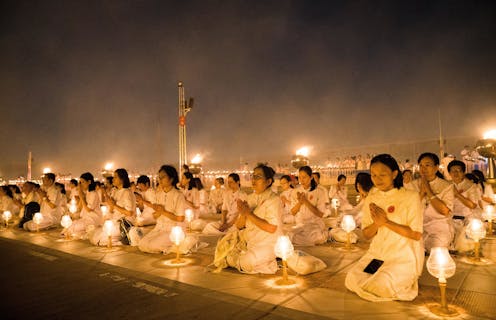In times of stress, turning to contemplation can be helpful – here's why religions emphasize rest
Most religions have periods of rest incorporated into their practice. Medical science has affirmed that short periods of contemplation can have benefits for one's physical and mental health.

Over a year of dealing with COVID-19 has left a lasting imprint on our daily lives. The pandemic disrupted usual work routines, with the majority of Americans having to work from home for long spells. While working from home has some hidden benefits, such as no daily commute, it also resulted in longer workdays and high levels of stress for many.
A global study of the communication patterns of 1.3 million workers during the global lockdown showed the average workday increased by 8.2% during the pandemic, and the average number of virtual meetings per person expanded by almost 13%. Many in the workforce felt overloaded with never-ending online meetings and unexpected family obligations that added pressure to the lives of working parents and other caregivers.
People’s well-being can be profoundly impacted if work-life balance ignores the need for rest and recuperation. As a scholar who studies the sociology of religion, I know that the themes of rest and contemplation are woven throughout the fabric of most religious traditions, and they remain equally salient in our lives today.
Faith, contemplation and rest

The Abrahamic traditions of Judaism, Christianity and Islam view a day of rest each week as a sacred right and responsibility of believers. The traditional Jewish Sabbath offers a 24-hour period beginning at sundown on Friday when the busyness of everyday life halts. Participants gather to worship, share a meal, study and pray.
Similarly, practicing Muslims celebrate their holy day on Fridays. This is a time when Muslims step away from work to attend a midday jumah, a prayer service at a local mosque, where imams offer sermons on a range of intellectual, spiritual and practical topics and lead congregations in prayer.
Although attendance numbers are declining, many Christians observe the holy Sabbath on Sundays through church attendance, communal worship, music and the sharing of the Eucharist, when Christians consecrate and consume bread and wine representing the body and blood of Jesus Christ. The Christian Sabbath represents a time to rest, pray, worship and spend time with family.
Branches of Islam, Christianity and Judaism additionally call for regular times of prayer and contemplation as part of daily and yearly cycles. In the Islamic tradition, stopping to pray throughout the day represents one of Islam’s five pillars of faith.
Through the practice of meditation, religious traditions quiet the senses in order to achieve a mindset of rest that they believe brings about heightened consciousness. Hindus, Buddhists and Jains teach the concept of dhyana, which generally translates to “contemplation.”
Through yoga, meditation and other contemplative practices, practitioners can achieve a state of meditative consciousness and self-awareness that can lead to better mental, physical and spiritual health.
Quieting the mind
Religions emphasize the need for rest and quiet reflection so our over-cluttered minds can focus on prayer and other contemplative practices. The Apostle Paul discusses how cultivating the “fruit of the spirit” through prayer and contemplation moves us toward patience and away from egocentrism.
Buddhists believe that quieting the mind through meditation can help people recognize that their feelings, perceptions, worldviews and even the self are impermanent features of life that can cause suffering. It can also help people contemplate their connectedness to the world around them.
Rest and contemplation help connect religious people with the deeper sources of meaning they seek to cultivate through scriptural study, meditation and prayer. As the American Trappist monk Thomas Merton explains in his 1948 autobiographical book “The Seven Story Mountain,” contemplation is a time of rest, the suspension of activity and a “withdrawal into the mysterious interior solitude in which the soul is absorbed in the immense and fruitful silence of God.”
Health benefits of rest and meditation
Medical science has become religion’s unexpected partner in confirming the benefits generated by these religious practices.
Researchers have found an association between downtime, learning and creativity. Sleep, nature walks and exercise offer a number of life-enhancing benefits, including improved memory, productivity and physical health. Recent advances in neuroimaging technologies have allowed researchers to observe brain changes during times of intense prayer, yoga and mindfulness meditation. Scientific evidence suggests that engaging in these practices may lead to improved health and well-being.
A broad range of clinical studies on mindfulness, decentering and acceptance therapies note that regular meditation can physically alter the brain and how it responds to the world. For instance, these practices have been found to transform the brain’s neural pathways and create new neurological networks that can lead to improved health and well-being.
Research on the practices of Japanese and Chinese Buddhist monks reveals benefits for physical and mental health. Furthermore, active meditations, such as yoga, qigong and tai-chi, are found to increase a sense of well-being through the regulation of mood and the reduction in anxiety and depression.
Even in the midst of a pandemic – or a stressful work week – taking time to rest, exercise, sleep, meditate or pray can lead to improvements in our everyday physical, mental and spiritual health.
[Get the best of The Conversation, every weekend. Sign up for our weekly newsletter.]
Kristen Lucken does not work for, consult, own shares in or receive funding from any company or organization that would benefit from this article, and has disclosed no relevant affiliations beyond their academic appointment.
Read These Next
What Olympic athletes see that viewers don’t: Machine-made snow makes ski racing faster and riskier
US Olympic skiers and scientists explain the sharp differences between natural snow and machine-made…
A terrorism label that comes before the facts can turn ‘domestic terrorism’ into a useless designati
A ‘domestic terrorism’ label that comes before the facts teaches the public to treat the term as…
Clarence ‘Taffy’ Abel: A pioneering US Olympic hockey star who hid his Indigenous identity to play i
Despite being a foundational figure in American hockey, Taffy Abel – who hid his Ojibwe heritage so…






